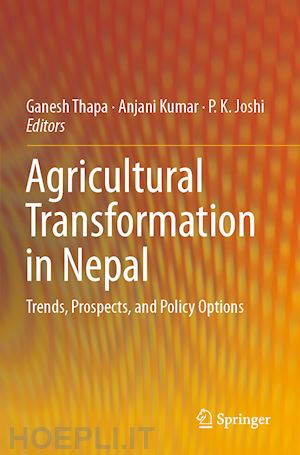Dr. Ganesh Thapa worked for the International Fund for Agricultural Development (IFAD) from March 1998 to April 2014 as the Regional Economist for Asia and the Pacific region and as the Country Programme Manager for North Korea. He is currently a Visiting Scientist at the International Centre for Integrated Mountain Development (ICIMOD). He holds a Ph.D. in Agricultural Economics from Cornell University, USA, and degrees from the University of the Philippines and G.B. Pant University of Agriculture and Technology, India. As the Regional Economist, he led IFAD’s work on policy analysis and strategy formulation for agricultural development and rural poverty reduction in Asia and the Pacific region. Prior to joining IFAD, he worked as the Country Director for Winrock International in Nepal and led a project on policy analysis in agriculture and natural resource management. He has also worked as a Senior Economist for the Ministry of Agriculture, Nepal. He has conducted research and published books and articles on such topics as risks, vulnerability, and poverty reduction; sustainability of microfinance; indigenous peoples and poverty reduction; effects of new agricultural technologies on income distribution; constraints on agricultural marketing; and food security and environmental policies.
Dr. Anjani Kumar is a Research Fellow with the South Asian Chapter of the International Food Policy Research Institute (IFPRI) based in New Delhi, India. He obtained his Ph.D. in Dairy Economics from the National Dairy Research Institute (NDRI), Karnal, India, and has over two decades of research experience in dairy economics, trade, food safety issues, food and nutrition security, agricultural growth, etc. He has to his credit several awards including the Lal Bahadur Shastri Young Scientist award, and awards from the Dr. R. T. Doshi Foundation and National Academy of Agricultural Sciences. Prior to joining the IFPRI, he was a Principal Scientist at the National Institute of Agricultural Economics and Policy Research (NIAP) and at the International Crops Research Institute for the Semi-Arid Tropics (ICRISAT). He also worked as a Senior Agricultural Economist with the International Livestock Research Institute (ILRI).
Dr. Pramod Kumar Joshi is Director, South Asia, of the International Food Policy Research Institute (IFPRI). He previously served as Director of the National Academy of Agricultural Research Management (NAARM) and National Institute of Agricultural Economics and Policy Research (NIAP). He holds a Ph.D. in Agricultural Economics from G.B. Pant University of Agriculture and Technology, Pantnagar, India. He has more than four decades of research experience in technology policy, research evaluation, impact assessment, agriculture marketing, institutional innovation, water markets, trade, etc., and is a recipient of several awards such as the Professor R. C. Agarwal Lifetime Award, Dr. M. S. Randhawa Memorial Award of the NAAS, D.K. Desai Award of the Indian Society of Agricultural Economics, and Dr. R. T. Doshi Foundation Award.











